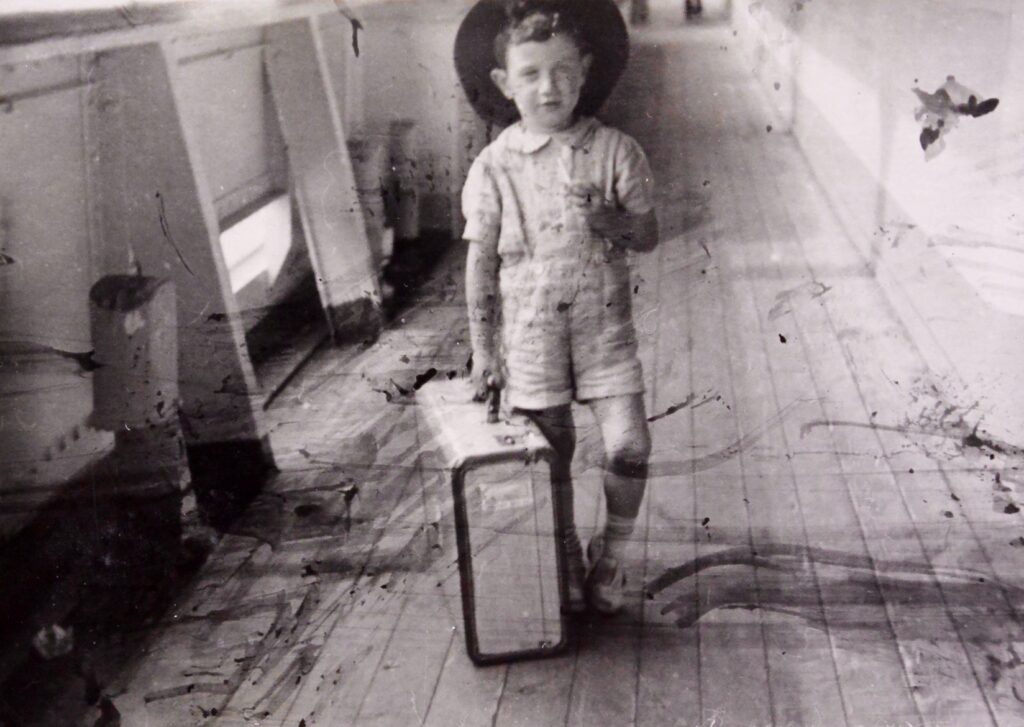
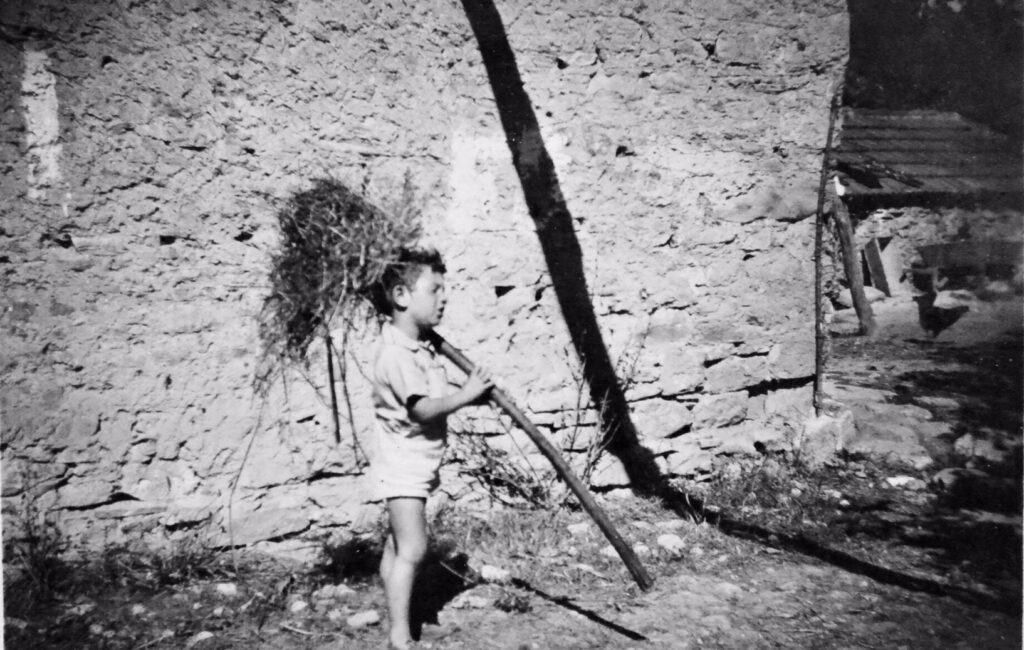
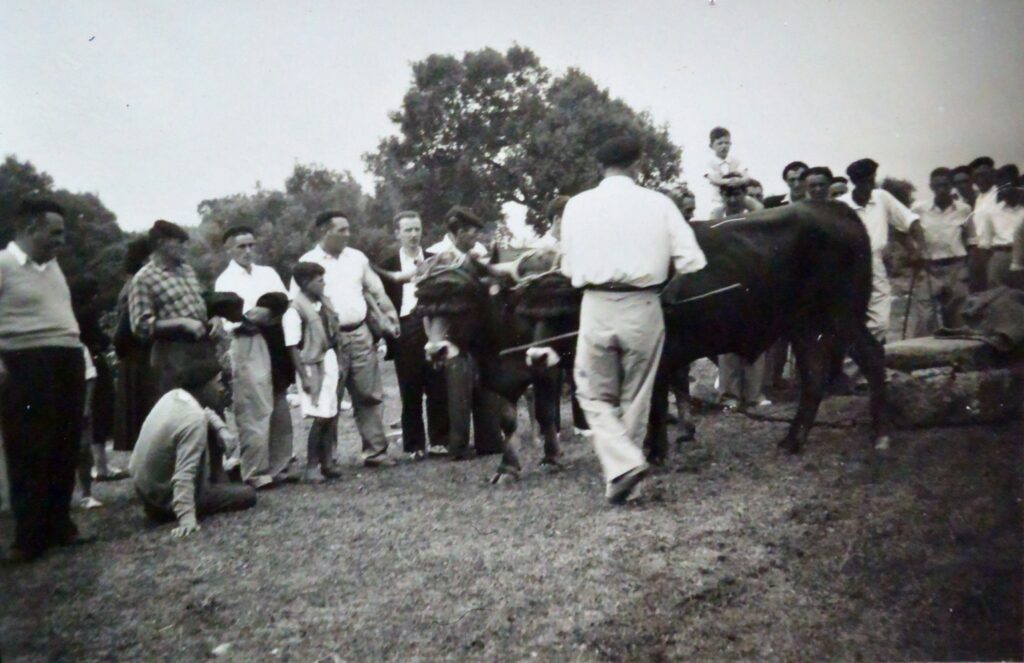
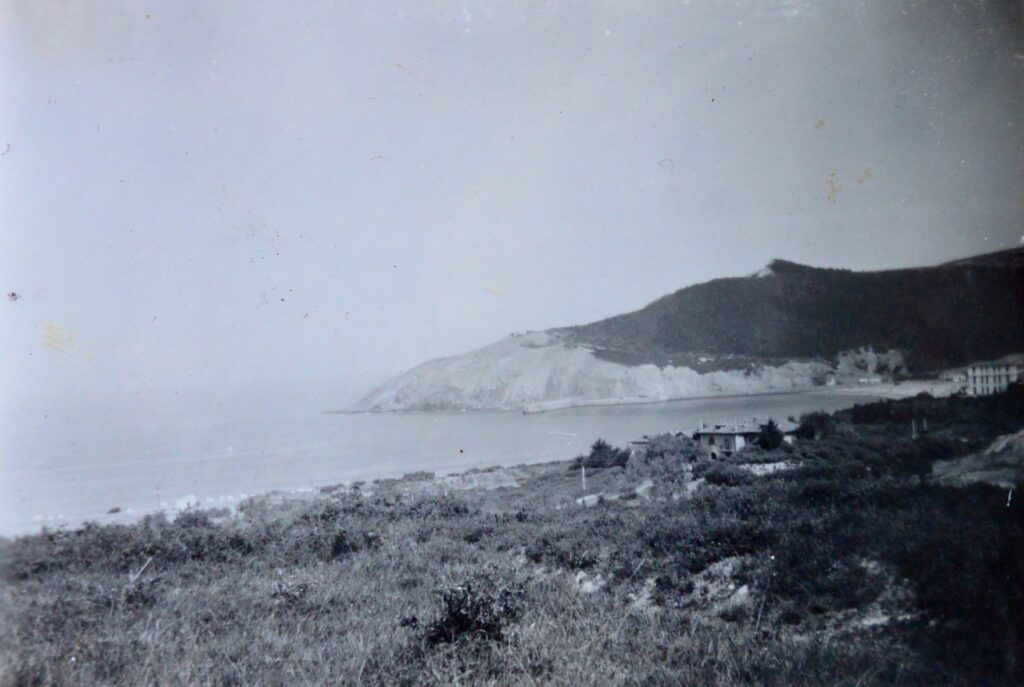
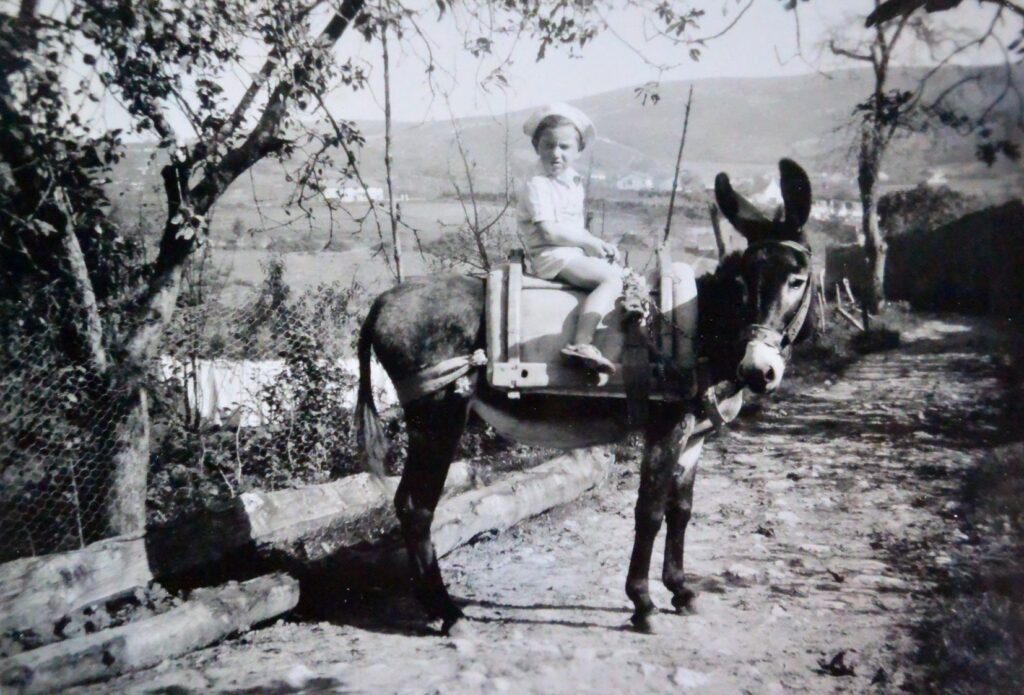
Join us in the first episode of Ygartua Art Chronicles as Ed and Paul discuss Paul’s early adventures, family roots, art studies during the 50s and 60s in Liverpool and the Basque Country.
Check out the blog post here to see pictures.
Ed (00:06):
Hi, and welcome to the Ygartua Art Chronicles podcast, where we explore the amazing life and career of Paul. I’m Ed Hoskin, and today we are going to cover the early part of the period before Paul moved to Canada and became a professional painter. We’ll find out about his roots traveling education and all of his adventures in Liverpool, the Basque country, and more. Hi Paul, and welcome to this first episode of the Ygartua art Chronicles podcast. I’m looking forward to delving into your life and career throughout the next few weeks. For this first episode, it makes sense to go right back to the origins,your beginnings. And I thought, we’d start this whole journey using the word heritage, because I think that’s a key element of, of your life. You speak about heritage and pride and pride of your origins quite a lot. And it also comes through in your work, of course. So, et’s go right back to the beginning and tell me where, mhere, where does Paul come from and what was the start of your life…
Paul (01:21):
Well I was actually born just outside of Liverpool in a small town. My father was Basque, a political refugee from the Basque country in Spain, because during the civil war, he was actually on a boat going around the world as a training to be an engineer and the war broke out. And of course my father was of military age for Spain. So he would have had to go back and fight for Franco against his own people. So when the boat docked in Liverpool there was about 20 basque kids on the boat all around 17, 18 years of age. And they were told that if they wished to, they could get political asylum and leave the ship and not go back to Spain. So that’s what happened. That’s how he ended up going to live in Liverpool and meeting my mother.
Ed (02:19):
So that boat was a Navy boat, was it?
Paul (02:25):
Yeah, it was a boat that was probably half made up of passengers. And he was training as an engineer on board, but it was going to South America and all around the world. And then basically heading back to Bilbao in Spain, in the Basque country.
Ed (02:43):
And went to Liverpool probably because it was an enormous dock town.
Paul (02:47):
That was the last port of call before they hit Spain. Luckily they heard the information from the British to leave the ship if they wanted to.
Ed (03:00):
I’ve read that there was a group of British either civil servants or people there explaining all that to them, as they docked.
Paul (03:12):
Yeah, it was that’s right. They came aboard and they said any Basques that do not wish to go back to the war can actually leave the ship right now. And they would be getting help in Liverpool, getting help to relocate, you know? Wow. Which was interesting, you know? Yeah, yeah. It was quite interesting. He couldn’t couldn’t speak a word of English. So I guess it took him about four or five years to learn English and get jobs and everything. And of course he was discriminated against to begin with because they thought he was Spanish. They were against the civil war and against Franco, the Brits. And he, because he was Basque, they didn’t understand the difference between being Basque and being Spanish. So he, had a few problems, you know?
Ed (04:03):
Yeah. That’s amazing. And what year was that? Do you know that?
Paul (04:08):
Well, well, it would be, let me see. When did the war start? Civil war 38, because when he got to England, of course, the world war second world war started as he got there.
Ed (04:32):
Spanish, civil war itself. I’m looking it up. It says 36 to 39.
Paul (04:37):
Then it must’ve been around the same time because Franco gave Hitler a pass. He said, if you don’t attack us, we won’t join the opposition, you know, and fight you.
Ed (05:00):
And then as soon as he arrived things heated up in the UK as well…
Paul (05:07):
He would have joined, he would have liked to have fought against the Germans, but he wasn’t allowed to. So he actually joined the home guard and the home guard consisted of him driving a truck around delivering bombs to all the Aircheck stations in Liverpool. Wow. So he used to do that during the air raids and he said he used to drive with no lights on the truck so that he wouldn’t attract attention. I mean, he had a truck full of bombs. Can you imagine driving around full of bombs? And he said, I felt safer with the bombs and the back of the truck than staying at home, waiting for one to land.
Ed (05:48):
So he was in the home guard. Cause I guess is it because he was a refugee that he was not allowed to fight in the army?
Paul (05:54):
Right. Because he wasn’t British, he was a political refugee so he wasn’t actually allowed to. And plus I don’t know whether, well, I guess at 17 he could have joined the war effort. I’m not sure how old they were, but anyway, for one reason or another he couldn’t.
Ed (06:10):
Yeah,Yeah.
Paul (06:15):
Well, one of his famous stories was that the he used to drive around in the truck delivering these bombs, but he would never, he didn’t want to stop anywhere. So one day he was visiting a friend and the friend said, Oh, come on in and have a drink. You know? And my dad said, nah, I feel better just driving my truck and, you know, delivering these bombs. Right. Anyway, he drove about a hundred yards down the road and a bomb dropped on the house and killed everybody. So he felt his choice was the right one!
Ed (06:46):
Wow. That’s fantastic. And so your father was from Basque heritage and I’ve read in places you’re quite aware of your grandfather’s,activities and heritage back then. And the fact that he was quite well installed in the Basque Country.
Paul (07:10):
Well, he was actually a head chef on one of the biggest ocean liners, which went round the world as well. Of course, everybody from these villages usually went to sea. That was the way they made a living and they’d send the money home to their families, you know, cause it was just a fishing village, but he ended up a head chef on the Rainer del Pacifica, which was at the time it was the biggest ocean liner in the world. And of course being the head chef, the privileges were great. He used to have five taxis waiting when the boat came home to, to ship everything into the village that he acquired.
Ed (07:49):
Fantastic
Paul (07:50):
He ended up buying half a mountain. And and of course everybody was quite happy about that. The whole village loved him cause he’d come home with so many gifts for everybody. He was a good guy. Although he probably, he probably did bring home some gold objects and exchange the money and did, did a few things that he acquired from Mexico. A lot of bartering.
Ed (08:15):
And I imagine that the Ygartuas had to put up with a bit of Franco when they were there then as well.
Paul (08:21):
Oh, the, the military, the Guardia Civil, they rode all over the family farm. They took their horses to train them. They destroyed the crops. And my grandmother at the time was running the farm because of course my grandfather was away at sea for nine months a year. And yeah, they just came in and totally controlled. The whole area destroyed things, practiced with their horses and crops of course were destroyed, you know, a pretty tough time in those days. You know, luckily my grandmother did have a farm, so she was able to, to share her crops with the villagers and everything. And so it worked out pretty good in the end, but boy, it was a tough time, of course. And it was still tough until Franco left. You know, they had the military police were there up until, I guess, I don’t know, until about 20 years ago it was time flies. Right?
Ed (09:23):
Yeah. So if we move on your dad is in the UK and the second world war breaks out at some point he met the love of his life, apparently
Paul (09:38):
That’s right. My mother, an artist as well. Yeah, first of all, she was actually engaged to a policeman and he ended up getting killed in the war and then, and then she met my father. And so that was the love of her life, of course. And we ended up living, of course in those days, no one had much money and it was during the war. I wasn’t of course around yet. They lived they lived with my auntie and then her sister, then they lived with the gentleman who’d who took my father in and helped him when he got off the boat. And then when I was born towards the end of it, right at the end of the world, then we ended up living in different places as well, till I was six years of age when they were able to end up getting a council house.
Ed (10:34):
Was that living with The famous Mr. Percival?
Paul (10:39):
That’s right. Yes.
Ed (10:41):
Fantastic English name. Yeah. So he was the first guy that would have met your father off the boat.
Paul (10:50):
He was actually, an Oxford graduate and a very clever, clever chap, but he had a house and he was part of the group that went to the boat to help them relocate. And so each one of them took one of the guys from the boat and basically volunteered for them to stay at his house. And, you know, he had no children. So it was nice to have a young man in the house and help to help him as well.
Ed (11:21):
Mm. Cause your father was what 17, you said
Paul (11:24):
That, right. 17,
Ed (11:26):
So good shape. And you know,
Paul (11:28):
Oh God. Yeah. My dad was real, real physically fit type of guy.
Ed (11:34):
And so they met and what was your mother doing at the time?
Paul (11:39):
She was a hairdresser working for her mother. Her mother had a hairdresser’s shop in New ferry, which was about five miles from the ship building company, which meant of course that during the air raids, there’s a lot of bombs falling all around because they were all aiming for the, for the shipyards where they were building submarines and things.
Ed (12:09):
And at some point little Paul was born.
Paul (12:14):
Yes. That was the 16th of June 90 and 45, probably a month after the war had finished or just before it had finished. Yeah. She said that she, she was carrying me for nine months, of course, during the bombing and everything. Yeah. So that, that was quite an interesting time for her. That’s why I probably was born only four pounds.
Ed (12:36):
Four pounds is what
Paul (12:38):
less than two kilos
Ed (12:41):
Crikey that’s light, isn’t it? Yeah.
Paul (12:44):
She was told I was perfect. Just little.
Ed (12:51):
And, you’re the first born and you have a brother?
Paul (12:57):
Brother. He wasn’t born for 10 years after me because my father said after me took him 10 years to decide to have another. When I was four years of age, of course, we went back to Spain, to the Basque country. And that’s because my father, by then he was a British subject. But besides that, there was an amnesty and he wasn’t going to go back unless there was an amnesty. It was 11 years after the civil war had ended that they decided to give an amnesty for all the Basque men and women who had fled the country. Yeah. And so we went back and that was a fascinating, I was four years of age. We we were met at the railway station with a donkey and cart to carry the suitcases and all of us back to the farm. My mother didn’t know where she was going to Liverpool ended up in a farm with donkeys and cows.
Ed (14:06):
And that was the first time that your mother had been to Spain, I suppose at all.
Paul (14:13):
Yeah.
Ed (14:13):
And in those days, what was it? Was it like a week long boat trip or how did it work?
Paul (14:18):
Well, it was from Liverpool. I think it was, maybe four or five days from Liverpool in those days, you know, very exciting. Well, you know, it was, my mum was obviously impressed with the land cause we had, you know, half a mountain and it was right by the beach. So it had its own walk down to a little beach and everything, which was fantastic, you know, for me anyway, I was on the beach every day.
Ed (14:45):
Fantastic. Yeah. A bit different from Liverpool. Although by the water, I suppose there’s a link there. Isn’t there, I suppose.
Paul (14:52):
But there were no English people anywhere, in those days
Ed (14:57):
Nowadays it’s a bit different.
Paul (14:59):
Yeah. Well not in the Basque country, the Brits, don’t go there. They go to the Benny Dorm and all those places on the med Mediterranean more and more so, so no one of course spoke English. We were there for six months and I actually forgot all my English and I was speaking Spanish by the time we went back to England and that was it. That was exciting as well. My cousins in England didn’t know where the hell I’d come from.
Ed (15:27):
Yes. That’s true. And was the idea that you were going to, that your dad was going to find a job or was it just let’s let’s spend six months in my home country and get back to my roots.
Paul (15:39):
He got a leave of absence from his work. He was so good at the job. You know, as an engineer that they didn’t want to lose him. So they gave him a leave of absence for six months. So he was going to come back and work again, which was great, you know? And then when we were on the farm. He worked on the farm for my grandmother and with his brothers and sisters, you know, cause he had three brothers and two sisters. So yeah. You know, so it was a great time. I just grew up with animals there. I had my own donkey. I watched little calves being born. It was just an amazing time. I mean, I can’t remember it now of course, but we do have photographs of that time period, my mother, because she was an artist, she was the only one in the village who had a camera. And so, she was photographing everywhere. So that’s the only record we have of that time, you know?
Ed (16:37):
And you can’t actually physically remember any of those that time?
Paul (16:43):
Not really. I barely remember. Yeah. Parts of the animals, the donkey and the cows, you know, because of course the donkey was still there when I was going back there years late. It lived to 19 years of age, this donkey. So I saw that donkey over a period of, you know, eight or nine years
Ed (17:04):
Now. I just, I discovered this today, but is it true that the donkey was called Mayo? Mayo and actually the point out for everyone listening that your son in law is called Mr. Mayo, is that not true? That’s right. That’s interesting. He’s not a donkey, but he works as hard as one I think!
Paul (17:27):
We’re glad of that. That’s right. We don’t mind workers. We won’t accept non-workers in the family that’s for sure.
Ed (17:34):
So you were born and then you went to school in Liverpool, in Bebington as a child. Can you remember your primary school times or being a little boy?
Paul (17:50):
From six years of age. I remember quite a lot. Yeah. My first primary school and then we went to the secondary modern school in New Ferry. I used to cycle in those days. Can you imagine, they’d let you go to school on your own at six years of age. That doesn’t happen anymore. No, no, no,
Ed (18:14):
No, no. We freak out if they’re cycling at 11 these days, so, yeah. And what was it, was it a happy time, school time?
Paul (18:23):
Oh yeah, I had a great time. Yeah. I had a friend, until he popped off a while back, but he had been with me since I was six years of age, Derek, a guy called Derek Dunbar and we we did everything together and we even joined the YMCA. We did spelunking, pot-holing together, caving, all kinds of things and traveled together and he died at 40. So that was quite a while back now.
Ed (19:00):
And during your school time, did you get any sort of a sniff for the artistic side? Because I’ve read that you obviously observed your mum painting and would sit nearby.
Paul (19:15):
I used to sit with her and that, but at the time when I was at school, I was more interested in gymnastics. So my idea then was to be a PTI in the army. I wanted to go and join the army and be a physical training instructor there. So I did about eight years of gymnastics and my friend Derek joined the army. And I went with him when he joined and after I saw the interview and then the Sergeant said, right, Mr. Dunbar, stand up to attention. I thought, I don’t think I am going to join this club after all. Yeah, he ended up a Para trooper and then ended up getting injured and then retiring. But no,, I, I wanted to be a physical training instructor, but of course my mother being an artist, I was swayed more in the end towards that. And of course there was nothing else I was good at. So I ended up in art school when I was 15.
Ed (20:20):
And do you remember the sort of art? Did you have art teachers in those days in secondary school? Cause I can remember my art teacher and it was quite important. The art teacher can either be a good path or, you know, not necessarily the right thing, but my art teacher was fantastic.
Paul (20:39):
We had a great time. We had a great art teacher and so, I excelled in art and of course, woodwork anything to do with my hands. I’d played rugby, I really loved playing rugby. Cause you know, in a scrum half your hands are the most important thing, you know, picking the ball out of this group, passing it along the three quarter. So I was good at all that. And because I wasn’t good at maths or English, I’m very bad at spelling, I ended up at art school. That was it.
Ed (21:13):
Indeed. And, I guess, there’s a mix of your father’s technical kind of hands-on manual skills and engineering skills and your mum’s artistic side.
Paul (21:31):
Funnily enough, I’ve still got a drawing my grandfather, my Spanish grandfather did for me. He drew me a picture when I was four years of age with the donkey and I’ve still got that. So it came from both sides the art side..
Ed (21:50):
Ah, from the other side. Right. I’ve got you. And your mother, It wasn’t her career I presume, was it?
Paul (21:58):
No. Well, she could have been better. Cause actually she says having a child during the war, you know, no one was buying artwork, she couldn’t sell her paintings then. And so she ended up basically looking after me and I guess it must have been a handful because she said she waited 10 years to start painting again.
Ed (22:27):
Yeah. Then you would have seen her painting. That was her activity she would have been doing all the time. So you got used to brushes and all the technical aspects.
Paul (22:39):
Right. Our attic was full of paintings that she had of nudes that she’d painted when she was at art school. And so I used to sneak the paintings to school and sell them. Yeah. Could you imagine? I even sold a couple of nude, nude paintings to the teachers. Wow. My mom never found out till about till I was probably about 30 years of age. I told her.
Ed (23:10):
Excellent. And you’ve still got some of her art, I suppose, hiding away
Paul (23:15):
We have quite a few paintings in a locker at the moment from her. Yeah. When, when she passed on my brother and I just separated everything, we did it all in one night, the house, the cars, everything.
Ed (23:31):
And do you see any similarities with your art in, in hers? Do you see touches that you recognize or was it different?
Paul (23:39):
Totally different. Yeah. She was more of a traditional, you know figurative painter. I mean, I think some, maybe some have some similarities, but not much, you know? Yeah. She never got the chance to actually carry it on because she left it for 10 years. It’s almost impossible to get back to where you were. You know what I mean? She was really, really good when she was 18, 20, but then, she left it when I was born, she left it for 10 years and then I see her work after that. Just wasn’t the same-it just lost something. You know what I mean? She was still good, but she could have been really great, but because she left it, I think that’s the big mistake of anything, you know, anything physical, if you leave it, you just get rusty, you know?
Ed (24:32):
Yeah. Muscle memory disappears and you have to relearn stuff and things like that. Yeah. Lucid. Yeah. That 10 years also would have brought on your brother, Ramon was born then?
Paul (24:43):
Yes. That my little brother, I was, I was the babysitter then after him, when I was 10, they’d go off to parties, my mum and dad. And I would invite all my friends from the art school over and have a party with my brother, supposedly looking after my brother. And he loved it. Yeah. Oh yeah. You kidding these girls, all these girls coming up to visit him in the bedroom.
Ed (25:16):
Crikey and Liverpool back in those days. I’ve seen a lot of mention of the summers spent in the Basque country. Was that when you were sort of teenager or was that when you were 11 or?
Paul (25:34):
Well, every summer from the age of four, it was six years of age, seven, eight years of age, 10 years of age, all the way up, you know?
Ed (25:42):
So from that first visit, then it continued each summer.
Paul (25:46):
Every, probably every, sometimes every two years if we couldn’t make it absolutely every year, you know?
Ed (25:54):
Yeah. Secondary school finishes. And then what happens next?
Paul (26:00):
Well, for me, it was straight to art school when I was 15. I left after I did my GCEs left straight away basically and went to art school
Ed (26:10):
And that’s not the Liverpool school of art itself.
Paul (26:12):
It’s called the Laird school of art in Birkenhead, right over the river from Liverpool.
Ed (26:18):
Okay. And that was more like a foundation year. And after that was it,
Paul (26:23):
It was a one year, one and a half year course. It was called a pre preliminary arts and arts and crafts class. And from there, you choose where you want to go. And I chose Liverpool art school. And then you go and you choose which department you want to go in, in the college. You either take painting or I took silversmithing cause I loved designing things. And so silver smithing seemed really interesting because it was a combination of working with your hands and with your mind, you know, with your drawing skills, I mean, I still did life drawing and things like that, but it was more or less working, molding the metals into shapes. And that’s a lot of fun. I love that.
Ed (27:09):
And this was at the Liverpool school of art. So you start there and you choose your specialty and I’ve read that there was, an influence from your dad as to what you were going to pursue
Paul (27:31):
Yeah, having a degree in something serious. He didn’t want another artist in the family. That’s for sure.
Ed (27:34):
Yeah. A penniless artist.
Paul (27:37):
He hadn’t made any money with the first artist, so he didn’t think there were many possibilities in art. So he said, you take a degree. And so I took a degree in industrial design and that’s why I was in the silversmithing and designing area. You know, not that I’ve done much with it since because I started painting, I guess, as soon as I got to Canada.
Ed (28:00):
Exactly. Yeah. So you, when you started in the school of art and you were what? 16, 17,
Paul (28:08):
16 in Liverpool? Yeah. 16 or half 17 nearly. I did that for two years.
Ed (28:14):
And that would be in 1961
Paul (28:17):
62, I guess. I’m not sure when that was roughly somewhere around that.
Ed (28:23):
Yeah. 61 62. So, and that must have been, I mean, if you ask most artists to go back in time and say, where would you want to be as an artist in what, in which city, at what time the high percentage would probably say Liverpool early sixties. Okay. So I’m sure a lot of people want to hear what, how fantastic it was. And we all have images of that time and, and what we think it might have been like, but what was it?
Paul (28:54):
It was like, it was like Nashville. I mean, it probably better because in those days you couldn’t go to a club or a pub or even a house party without there being alive pop group there, it was just, there were so many groups, there was something like 900 groups in Liverpool at that time. I mean, everybody knew a group. Everybody knew people in a group, you know, I knew Jerry and the pacemakers, I knew Jerry’s brother very well. Cause he was the bouncer at the at the cabaret club in Liverpool. And then I got to know John because he was at art school, his last year at our school, was my first year. That was basically it. And then I met him a few times there and then we ended getting to know each other a bit better. And then we walked down to the club when he was playing there in the lunch hours. And I used to go over to the Grapes and reserve the table for the band to come in after the break, because there was no alcohol served in there in the, in the club, you know,
Ed (30:01):
The band being the Beatles or, or the band being the Quarrymen or
Paul (30:07):
Beatles, but it well, Ringo wasn’t with them. Then it was just before that. They, they just changed their name from the quarry men to the Beatles. And that’s when was it best? Yeah, Pete best was the drummer. And of course, Ringo hadn’t started with them till after they, I guess when they went to Germany later on, you know. I never saw a Ringo in the group in the Cavern club once. He probably was later. I liked George the best George was the nicest. Paul was a little stuck up. Oh yeah. They both thought they were the cat’s whiskers, of course, for getting girls and everything, you know, not that they weren’t nice. It’s just that they were, you could tell who were the bosses and who weren’t the bosses in the group, you know.
Ed (31:00):
And what was John, was John doing fine art? Or I can’t remember what he was…
Paul (31:04):
Yeah, he did. He did fine arts at Liverpool college. Yeah. We were in a pub called the crack and that’s a little pub there, early artists and people from our college went to, and so we went, we were in there having a drink and there were these other two guys having a drinking contest. And one guy drowned down to a whole pint of beer in like three and a half seconds. And I said, Oh my God, I could never do that. And John said, Oh, me neither. He said, I wouldn’t even try. And anyway, I tried to do it about a, about an hour later and I did get it down in about four seconds, but then I vomited the whole lot back into the glass. And I said, there you go. I did it there and back in five seconds.
Ed (32:19):
Thanks for listening to the Ygartua art Chronicles today. Hope you enjoyed this first exploration of Paul’s beginnings. There are plenty, more excellent stories to come join us next time when we’ll be continuing to talk to Paul about his life before moving to Canada, if you enjoyed today’s episode, don’t forget to share with others post on social media or leave a rating and review the episode was recorded and edited by me, ed Hoskin, and was produced by Tala and myself music was by Hoskin and Clark. That’s all for this episode. Folks, see you next time.

